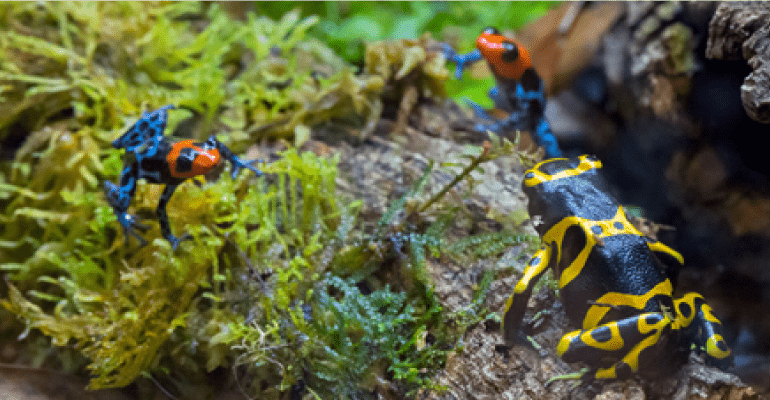
The Reid Park Zoo’s poison dart frog habitat opened to the public this month. The colorful frogs are the first amphibians at the Zoo in more than 10 years.
“Dart frogs are an important addition to Reid Park Zoo. Every animal we house has a story to tell and sometimes small animals tell big stories,” Zoo Director Jason Jacobs said. “Dart frogs and other amphibians tell the story of warning coloration, the beauty of nature and the importance of conservation as amphibians are a key indicator species that biologists study to determine the health of an ecosystem. You can compare the exquisite coloration of dart frogs to precious jewel.”
The dart frog habitat was made possible as part of a legacy gift to Reid Park Zoological Society by long-time Reid Park Zoo docent Fran Armstrong, who passed in December 2016. Fran, who served as a docent for four decades, wanted to leave a lasting legacy for future generations. As a result of Fran’s and her husband Ray’s generosity, the new dart frog habitat will now be available to the thousands of children who visit each year – the first of its kind in the Zoo’s Lee H. Brown Conservation Learning Center. Ray still serves as a docent at Reid Park Zoo.
“Precious and telling stories are attributes of Fran Armstrong, our beloved docent of over four decades whom this habitat is dedicated to,” Jacobs said. “Fran told stories to hundreds of thousands of children who met her. She told the story of so many of our animals, and she helped inspire generations of children to appreciate wildlife and the work zoos do.”
Poison dart frogs, can be found in the humid tropical rainforests of Central and South America. The lifespan of a dart frog is 3 to 15 years, and some species are endangered or critically endangered.
“In their ranges around the world, amphibians are facing a global decline as their habitats are threatened,” Jacobs said.
Dart frogs store poisonous toxins in their skin from the insects they consume, making them too toxic to touch. The frogs at Reid Park Zoo will consume wingless fruit flies, and therefore will not have any stored toxins.
